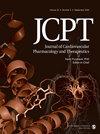Continuation Versus Interruption of Renin-Angiotensin System Inhibitors in Acute Decompensated Heart Failure: A Brief Report
IF 2.8
4区 医学
Q2 CARDIAC & CARDIOVASCULAR SYSTEMS
Journal of Cardiovascular Pharmacology and Therapeutics
Pub Date : 2022-01-01
DOI:10.1177/10742484221100127
引用次数: 0
Abstract
Evidence suggests that interruption of beta-blockers during acute decompensated heart failure (ADHF) in the absence of contraindications leads to poorer long-term outcomes. This study assesses whether similar effects occur when interrupting renin-angiotensin system inhibitor (RASi) therapy in ADHF. Data were retrospectively analyzed from patients admitted from 2015 to 2020 with ADHF and left ventricular ejection fraction (LVEF) ≤ 40% taking RASi therapy prior to admission. Patients were excluded if they required acute inotropic therapy or mechanical circulatory support, had worsening renal function (WRF), hyperkalemia, or symptomatic hypotension on admission. The primary endpoint was readmission for heart failure, which was analyzed using Cox regression analysis. One-hundred patients were included, with 22 patients in the interruption group and 78 patients in the continuation group. Baseline characteristics for each group were similar except for older age (67.4 vs 58.9 years; P = .014) and lower systolic blood pressure (120.5 vs 132.3 mm Hg; P = .037) in the interruption group. Interrupting RASi therapy was associated with a nonsignificant increase in the primary outcome (13.6% vs 5.1%; P = .177). Patients continuing RASi therapy were discharged on higher doses (10.1 vs 17.9 mg lisinopril equivalents; P = .044). Additionally, patients with interrupted RASi therapy were more likely to be re-admitted for WRF at 30-, 60-, and 90-day increments and at any-time after discharge (P < .05 for all). Adverse effects were similar except for more frequent hypotension in the interruption group at 72 hours (40.9% vs 14.1%; P = .013) and at any time (50% vs 19.2%; P = .004). In patients admitted for acute decompensated heart failure, RASi continuation in the absence of contraindications appears safe and was associated with more optimal guideline-directed medical therapy at discharge.肾素-血管紧张素系统抑制剂在急性失代偿性心力衰竭中的持续与中断:一份简要报告
有证据表明,在没有禁忌症的情况下,在急性失代偿性心力衰竭(ADHF)期间中断β受体阻滞剂会导致较差的长期结果。本研究评估了在ADHF中中断肾素-血管紧张素系统抑制剂(RASi)治疗时是否会出现类似的效果。回顾性分析了2015年至2020年入院的ADHF和左心室射血分数(LVEF)≤40%的患者在入院前接受RASi治疗的数据。如果患者需要急性肌力治疗或机械循环支持,入院时肾功能恶化、高钾血症或症状性低血压,则将其排除在外。主要终点是因心力衰竭再次入院,采用Cox回归分析进行分析。包括100名患者,其中22名患者在中断组,78名患者在继续组。除年龄较大(67.4 vs 58.9岁;P=0.014)和中断组收缩压较低(120.5 vs 132.3毫米汞柱;P=0.037)外,各组的基线特征相似。中断RASi治疗与主要转归的无显著增加相关(13.6%对5.1%;P=.177)。继续接受RASi治疗的患者出院剂量较高(10.1对17.9 mg赖诺普利当量;P=.044),90天的增量和出院后的任何时间(P均<0.05)。除了中断组在72小时(40.9%vs 14.1%;P=.013)和任何时候(50%vs 19.2%;P=.004)出现更频繁的低血压外,不良反应相似。在因急性失代偿性心力衰竭入院的患者中,在没有禁忌症的情况下继续RASi似乎是安全的,并与出院时更理想的指南指导的药物治疗相关。
本文章由计算机程序翻译,如有差异,请以英文原文为准。
求助全文
约1分钟内获得全文
求助全文
来源期刊
CiteScore
6.00
自引率
0.00%
发文量
33
审稿时长
6-12 weeks
期刊介绍:
Journal of Cardiovascular Pharmacology and Therapeutics (JCPT) is a peer-reviewed journal that publishes original basic human studies, animal studies, and bench research with potential clinical application to cardiovascular pharmacology and therapeutics. Experimental studies focus on translational research. This journal is a member of the Committee on Publication Ethics (COPE).

 求助内容:
求助内容: 应助结果提醒方式:
应助结果提醒方式:


